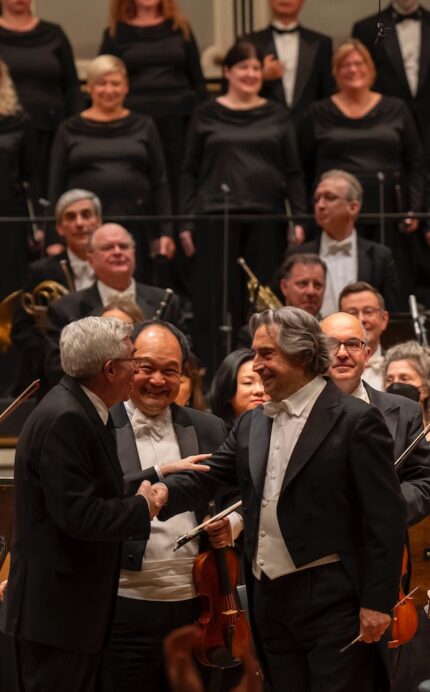Muti wraps his CSO tenure with a noble and dramatic “Missa Solemnis”

This weekend’s season-closing Chicago Symphony Orchestra concerts also mark the double bar for Riccardo Muti, as the Italian conductor concludes his 13-year reign as music director with Beethoven’s mighty Missa Solemnis.
For most of Friday night’s concert, it was business as usual. The festivities came after the performance with an onstage ceremony in which Muti was named the CSO’s Music Director Emeritus for Life—the first such title bestowed in the orchestra’s 132-year history, which reflects the close artistic partnership between Muti, 81, and the Chicago musicians.
While largely honorary in nature, his new title makes clear that Muti’s fruitful established relationship with the musicians will continue with regular season returns—good news for the orchestra and Chicago audiences as the CSO continues to search for a podium successor.
Beethoven’s epic Missa Solemnis was the sole work of the evening.
Unlike Mozart, who was an astonishingly fast composer, Beethoven was more of a plodder. Major works often took one or two years to finish, as he often revised and changed his original conception.
Yet even by his standard, the Missa Solemnis proved a challenge to bring to completion. Beethoven was keenly aware that his previous efforts at large-scale choral works—the Mass in C Major and Christ on the Mount of Olives—were not among his masterworks, despite their worthy qualities. He missed the original 1820 deadline for the mass and, after detaching to finish other works, the “Solemn Mass” was finally premiered in St. Petersburg in 1824.
Beethoven was an ardently religious man, with a singular belief system blending youthful Catholicism with a kind of humanistic pantheism. The Missa Solemnis reflects that unique spiritual mix. The setting of the Catholic mass fairly erupts with unbounded energy, close textual word-painting, and ecstatic bursts that seem to be straining for a spiritual transcendence that remains just out of reach.
Riccardo Muti has often stated how he felt intimidated by the Missa Solemnis and waited decades before attempting his first performance. Muti had scheduled the work previously for CSO concerts that were delayed by the pandemic.
In many ways, it was serendipitous that the conductor is winding up his 13 years in Chicago with his first local performance of the Missa. Friday night’s successful performance was a testament to Muti’s array of podium skills in bringing off one of the most complex and challenging works in the repertoire.
The conductor states in a program book interview that this multifaceted work is impossible to realize in its totality, and Friday night’s performance was perhaps stronger on the dramatic qualities than the moments of interior spirituality.
Yet this was by any account a noble, resounding and vocally resplendent Missa solemnis.
Muti began the performance in almost understated fashion with a gently consolatory rendering of the Kyrie. In the ensuing Gloria, the CSO Chorus exploded in joyous exuberance with Muti bringing great clarity to the bramble-bush fugal writing for voices.
While Muti favored spacious tempos, he maintained a firm focus on the long line in a work that can turn episodic in lesser hands. Tension sagged briefly in the extended Credo, but for the most part his pacing ensured the performance coursed with strong momentum. Beethovens’s dramatic contrasts were daunting and eruptive —as with the moment of psychic terror in the Agnus Dei, before the glowing benediction of the coda.
The orchestral playing was typically well prepared and polished to a high sheen. Robert Chen rendered the violin solos of the Benedictus with a chaste purity and expressive simplicity that was all the more moving for its understatement. (Muti, uncharacteristically, neglected to recognize the CSO concertmaster with a solo bow Friday night.)

What sealed this performance, however, was the world-class vocalism, both from the soloists and the Chicago Symphony Chorus.
There is almost invariably a weak link among any vocal quartet in works such as the Missa. Yet such was not the case here—even with Muti’s placement of the quartet at the back of the stage sacrificing some degree of presence in Orchestra Hall’s funhouse acoustic.
Still, all four soloists—soprano and Met star Erin Morley, mezzo-soprano Alisa Kolosova, tenor Giovanni Sali and bass-baritone Kyle Ketelsen—were consistently stellar. Each projected effectively in individual solos and as a cohesive group, singing with emotional expression and tackling Beethoven’s nearly superhuman demands with aplomb. (In one of his bon mots after the performance, Muti said, “Vocally, this is one of the most absurd scores ever written.”)
Along with the soloists, the evening belonged to the CSO Chorus.
The ensemble—105 strong—were masterfully prepared by Donald Palumbo for these concerts. Chorus master of the Metropolitan Opera, Palumbo split the chorus in two sections half on stage and half in the terrace. The result was greater separation between sections without any loss of power or impact in massed choral passages.
The large ensemble nailed the sudden attacks with striking unanimity and handled the fugal thickets and tortuous demands with remarkable polish and flexibility. Expressively, the chorus was alive to the inward moments as much as the heaven-storming climaxes.
Muti was clearly delighted with Palumbo’s work. He insisted on bringing the guest chorus director out with him for every solo bow, with his arm affectionately slung around Palumbo’s shoulders. In his postgame comments, Muti expressed the wish that Palumbo be the “permanent” chorus director of the CSO—another Orchestra Hall job that is currently open.